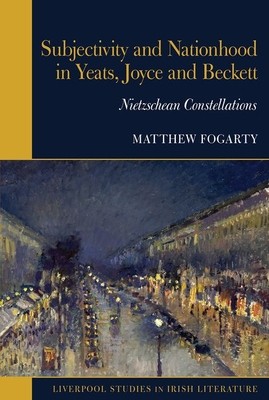
- We will send in 10–14 business days.
- Author: Matthew Fogarty
- Publisher: Liverpool University Press
- ISBN-10: 1802077227
- ISBN-13: 9781802077223
- Format: 15.2 x 22.4 x 2.3 cm, hardcover
- Language: English
- SAVE -10% with code: EXTRA
Subjectivity and Nationhood in Yeats, Joyce, and Beckett (e-book) (used book) | bookbook.eu
Reviews
Description
Subjectivity and Nationhood in Yeats, Joyce and Beckett: Nietzschean Constellations reconceptualises Friedrich Nietzsche's position in the intellectual history of modernism and substantively refigures our received ideas regarding his relationship to these canonical Irish modernists. Building on recent developments in new modernist studies, the book demonstrates that Nietzsche is a modernist writer and a modernist philosopher by establishing new parallels between his engagement with established philosophical theories and the aesthetic practices that Ezra Pound and T. S. Eliot identified as quintessentially modernist. With specific reference to key Nietzschean philosophemes - eternal recurrence, the Ãbermensch, transnationalism, cultural paralysis, and ethical perspectivism - it challenges the longstanding assumption that Yeats, who repeatedly acknowledged his admiration for Nietzsche, is the most 'Nietzschean' of these Irish modernists. While showing how both Joyce and Beckett are
in many important ways more 'Nietzschean' than Yeats, this interdisciplinary study makes a number of significant and timely contributions to the fields of Irish studies and modernist studies.
EXTRA 10 % discount with code: EXTRA
The promotion ends in 18d.09:18:11
The discount code is valid when purchasing from 10 €. Discounts do not stack.
- Author: Matthew Fogarty
- Publisher: Liverpool University Press
- ISBN-10: 1802077227
- ISBN-13: 9781802077223
- Format: 15.2 x 22.4 x 2.3 cm, hardcover
- Language: English English
Subjectivity and Nationhood in Yeats, Joyce and Beckett: Nietzschean Constellations reconceptualises Friedrich Nietzsche's position in the intellectual history of modernism and substantively refigures our received ideas regarding his relationship to these canonical Irish modernists. Building on recent developments in new modernist studies, the book demonstrates that Nietzsche is a modernist writer and a modernist philosopher by establishing new parallels between his engagement with established philosophical theories and the aesthetic practices that Ezra Pound and T. S. Eliot identified as quintessentially modernist. With specific reference to key Nietzschean philosophemes - eternal recurrence, the Ãbermensch, transnationalism, cultural paralysis, and ethical perspectivism - it challenges the longstanding assumption that Yeats, who repeatedly acknowledged his admiration for Nietzsche, is the most 'Nietzschean' of these Irish modernists. While showing how both Joyce and Beckett are
in many important ways more 'Nietzschean' than Yeats, this interdisciplinary study makes a number of significant and timely contributions to the fields of Irish studies and modernist studies.


Reviews